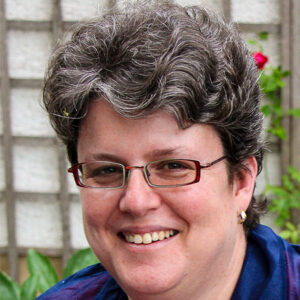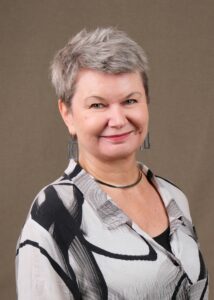 Prof. Debbie Ging
Prof. Debbie Ging
Dublin City University
Debbie Ging is Professor of Digital Media and Gender at Dublin City University, Ireland. She teaches and researches on gender, sexuality and digital media, with a focus on digital hate, online anti-feminist men’s rights politics, and the radicalisation of boys and men into male supremacist ideologies. She has supervised 9 PhDs to completion and is currently supervising a further 7 doctoral students.
Research Interests: Debbie’s interdisciplinary research combines methods and theoretical frameworks from internet studies, gender studies and anti-bullying research. Much of her current work addresses youth experiences of gender-based and sexual abuse online, and educational interventions to tackle this issue. Debbie is co-editor of Gender Hate Online: Understanding the New Anti Feminism (Routledge, 2019) and has published widely on the manosphere, incels and online misogyny. She is Ireland Corresponding Editor of the journal Men and Masculinities and is a member of the editorial boards of New Media and Society and Feminist Media Studies.

Prof. James O’Higgins Norman
Dublin City University
James O’Higgins Norman is the UNESCO Chair on Bullying and Cyberbullying at DCU where he is also Director of DCU Anti-Bullying Centre. He teaches and researches on equality and diversity issues related to bullying and online safety, with a focus on developing solutions to societal issues. He has supervised 7 research degrees to completion and is currently supervising a further 2 doctoral students.
As a clinical sociologist, James’ research is interdisciplinary combining theoretical frameworks and approaches from sociology, psychology, education, and anti-bullying research. Much of his current work addresses self-efficacy in relation to bullying and online safety, and educational and technological solutions to tackle these issues. James is an Editor-in-Chief of the International Journal of Bullying Prevention and co-editor of the Wiley Blackwell Handbook of Bullying (2021), and he has published widely on bullying in schools, online and in workplaces. He is also Principal Investigator or Co-Principal Investigator on a number of EU and Government of Ireland funded projects related to bullying, migration, online safety.
 Prof. Hildegunn Fandrem
Prof. Hildegunn Fandrem
University of Stavanger, Norway
Hildegunn is professor at the Norwegian Centre for Learning Environment and Behavioural Research in Education at the University of Stavanger (UiS), Norway. Currently she holds part of the UNESCO Chair position in Diversity, Inclusion and Education. She was recently (2019 -2023) the Vice Chair in Cost Action 18115 TRIBES: Transnational Collaboration on Bullying, Migration and Integration at School Level. She was also a management committee member of COST Action IS0801 on Cyberbullying: Coping with negative and enhancing positive uses of new technologies, in relation to educational settings. Norwegian Directorate of Education have used her as a national expert for developing national surveys and policy documents in the field of bullying, and for national competence building regarding inclusion of newly arrived immigrants. She is involved as a supervisor in 10 PhD projects.
Hildegunns main research interest lies in the field of inclusion and diversity. She has also contributed notably to the research field of bullying and migration. She has also researched bullying, including cyberbyllying, with a focus on emotional consequence of cyberbullying. Besides Participate she is currently involved in a smaller local research project focusing on cooperation to combat cyberbullying. Recently her interest for interdisciplinary research has increased, in particular she studies how to relate work to combat bias based bullying with subject teaching and didactics.
 Prof. Dagmar Strohmeier
Prof. Dagmar Strohmeier
University of Stavanger, Norway (Professor II)
Dagmar is professor at the University of Applied Sciences Upper Austria, Linz in Austria since 2011 and professor II at the Norwegian Centre for Learning Environment and Behavioural Research in Education at the University of Stavanger in Norway since 2018. She served as co-editor of the European Journal of Developmental Psychology and was the president of the European Association for Developmental Psychology between 2021-23.
Research Interests: Dagmar studies peer relations and bullying among adolescents with a cross-cultural and cross-national perspective and a special focus on immigrant youth. She has developed and evaluated an anti-bullying program (ViSC) that has been implemented in schools in Austria, Cyprus, Romania, Turkey and Kosovo. Currently, she leads a nationally funded project on future aspirations of adolescents.

Prof. Simona Carla Silvia Caravita
University of Stavanger, Norway
Simona is professor in educational psychology at the Norwegian Centre for Learning Environment and Behavioural Research in Education at the University of Stavanger (UiS), Norway. She is Secretary of the European Association for Developmental Psychology, member of the Directive Committee of research centre CERISVICO at the Catholic University of the Sacred Heart (Italy), and member of the International Advisory Board of the Institute of Psychology of the Czech Academy of Sciences (Czech Republic). She serves in the editorial board of the European Journal of Developmental Psychology and is author of books and several scientific papers published in international journals.
Research Interests: Simona’s research interests regard bullying, cyberbullying, peer-relationships and moral development. Among the research projects she has realized, since 2019 to 2023 she was principal investigator of a project aimed to develop evidence-based intervention to tackle ethnic bullying and cyberbullying, funded by the Italian Ministry of Universities and Research.

Prof. Eszter Salamon
IPA
Eszter Salamon is the Director of Parents International and an inclusion consultant for the European School Heads Association. Currently she is also a visiting professor at Vytautas Magnus University in Lithuania. Originally trained as a teacher, she started her career as a teacher at a primary cum secondary school. Later she became an economist and has been teaching in higher and vocational education. She started dealing with rights of the child topics in 1989 and has specialized in students’ rights and parents’ rights in the past 20+ years, being active on European level since 2009 and international level since 2015. She has earned her Doctorate in education leadership focusing on parental empowerment and engagement, and child participation. Her activities and research interests are related to 21st century education, school leadership, parental engagement, quality and inclusion, education-related rights and accountability, and collaboration. Her recent publications include research on teacher and school leader roles and careers, open schooling, innovative and inclusive STE(A)M education, family support systems, and parents’ perceptions of and engagement in education. Her team has developed globally acknowledged practical initiatives on parental engagement, child participation, open schooling, education inclusion. She has been invited to participate at expert groups at the Council of Europe and OECD. In the field of parental engagement, her main area of activities is related to professionals’ perceptions and capacity-building needs for better collaboration. Her work is framed by her experience as a teacher, as a parents, as a school board president as well as a researcher and trainer. She is a bookworm and a dog-lover.

Prof. Liza Tsaliki
National and Kapodistrian university of Athens, department of communication and media studies
I am a cultural studies person, working qualitative methodologies on issues pertaining to gender, race, class and sexuality. In am interested in political engagement and participation (including young peoples’); celebrity culture (including celebrity reality, celebrity activism and philanthropy, celebrity ageing); gender and technology; porn studies; children/youth and media; children/youth and the debate about sexualization; popular culture; masculinities and femininities; post-feminism; motherhood; body aesthetics and fitness culture; race studies; People of Colour in Greece.

Prof. Christina Salmivalli
University of Turku, Finland
Christina is a professor of psychology and the deputy head of the INVEST flagship research center (https://invest.utu.fi/ ). She has done research on school bullying and its evidence-based prevention for three decades. Her team developed the KiVa® antibullying program (www.kivaprogram.net), which is implemented in large scale in Finland and > 20 other countries. Salmivalli has published widely on children’s peer relations and bullying in top-tier scientific journals. She received the Finnish Science Award in 2017and the William Thierry Prayer Award (European Association for Developmental Psychology) for excellence in research on human development. In 2020, she was a recipient the European Research Council’s (ERC) Advanced Grant for a 5-year project to study the most challenging cases of bullying. During her career, Salmivalli has supervised numerous PhD students and post-doctoral researchers.
Her research interests include bullying and victimization and their evidence-based prevention, studied with multiple methods in multidisciplinary contexts.
 Prof. Dorte Marie Søndergaard
Prof. Dorte Marie Søndergaard
Aarhus University, Denmark
Dorte Marie is a professor in social psychology, DPhil. from the Faculty of Social Sciences, University of Oslo 1996, and MA in psychology from the University of Copenhagen 1986. She is a member of the research hub Engage – (Dis)Engaging Children and Young People at the Danish School of Education. Søndergaard headed the interdisciplinary research project eXbus: Exploring Bullying in School (started 2007) and has published extensively on the topic ever since.
Her main research areas include:
- Bullying among children in schools, new conceptualizations of bullying as a social effect of entangling socio-cultural, socio-material, subjective and discursive forces (www.exbus.dk).
- Sexualized digital practices and gendered becoming among youth, online youth culture, analogue-digital subjectification and gendered normativity, social in-and exclusion.
- Violent computer gaming among children, relational aggression and bullying.
- Technology and human-robot-interaction (HRI) with a specific focus on the imaginaries and cultural normativity involved in robot-human interaction.
Teaching areas
Parallel to undergraduate teaching, Søndergaard has supervised numerous PhD students over the past 30 years. Some of the main teaching subjects concern the formation of youth and child subjectivity, wellbeing and bullying, gendered normativity and becoming, poststructuralist and new materialist theory, qualitative methods e.g. interview, analogue and digital ethnography and theoretically informed qualitative analyses.